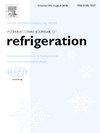Effects of sensor measurement error on fault detection and diagnosis model for data center composite cooling system
IF 3.5
2区 工程技术
Q1 ENGINEERING, MECHANICAL
International Journal of Refrigeration-revue Internationale Du Froid
Pub Date : 2025-04-10
DOI:10.1016/j.ijrefrig.2025.04.008
引用次数: 0
Abstract
Fault detection and diagnosis (FDD) model for the cooling system is beneficial in elevating the reliability of data centers. Nevertheless, the model accuracy could be degraded by sensor measurement error, which may arise due to environmental interferences or inadequate maintenance practices. In the study, the impacts of sensor measurement error on the convolutional neuron network (CNN) based FDD model for the data center composite cooling system are assessed. Additionally, the coupled effects of sensor error and system control strategies on the FDD model are investigated. The results indicate that in vapor compression mode, a negative fixed sensor error of 1 K leads to an average 5 % greater decline in the CNN model accuracy compared to a positive error of the same magnitude. In contrast, the positive fixed error causes a 6.5 % higher decrease in heat pipe mode. Additionally, sensor errors have a negligible impact on model accuracy until exceeding the threshold, and the threshold of fixed error is 0.2 K in CNN model. Further, as a key control strategy involved parameters, the evaporating temperature error is critical to FDD model accuracy. In the fixed bias conditions, when the error magnitude is 1 K, the accuracy of FDD model decreases within the range of 24.8 % to 45.1 %.
传感器测量误差对数据中心复合冷却系统故障检测诊断模型的影响
冷却系统故障检测与诊断(FDD)模型有助于提高数据中心的可靠性。然而,由于环境干扰或不充分的维护实践,传感器测量误差可能会降低模型的精度。在研究中,评估了传感器测量误差对基于卷积神经元网络(CNN)的数据中心复合冷却系统FDD模型的影响。此外,还研究了传感器误差和系统控制策略对FDD模型的耦合影响。结果表明,在蒸汽压缩模式下,与相同量级的正误差相比,负1 K的固定传感器误差会导致CNN模型精度平均下降5%。相比之下,正固定误差在热管模式下会导致6.5个百分点的高衰减。此外,在超过阈值之前,传感器误差对模型精度的影响可以忽略不计,在CNN模型中固定误差的阈值为0.2 K。此外,蒸发温度误差作为一种涉及参数的关键控制策略,对FDD模型的精度至关重要。在固定偏置条件下,当误差幅度为1 K时,FDD模型的精度下降幅度在24.8% ~ 45.1%之间。
本文章由计算机程序翻译,如有差异,请以英文原文为准。
求助全文
约1分钟内获得全文
求助全文
来源期刊
CiteScore
7.30
自引率
12.80%
发文量
363
审稿时长
3.7 months
期刊介绍:
The International Journal of Refrigeration is published for the International Institute of Refrigeration (IIR) by Elsevier. It is essential reading for all those wishing to keep abreast of research and industrial news in refrigeration, air conditioning and associated fields. This is particularly important in these times of rapid introduction of alternative refrigerants and the emergence of new technology. The journal has published special issues on alternative refrigerants and novel topics in the field of boiling, condensation, heat pumps, food refrigeration, carbon dioxide, ammonia, hydrocarbons, magnetic refrigeration at room temperature, sorptive cooling, phase change materials and slurries, ejector technology, compressors, and solar cooling.
As well as original research papers the International Journal of Refrigeration also includes review articles, papers presented at IIR conferences, short reports and letters describing preliminary results and experimental details, and letters to the Editor on recent areas of discussion and controversy. Other features include forthcoming events, conference reports and book reviews.
Papers are published in either English or French with the IIR news section in both languages.

 求助内容:
求助内容: 应助结果提醒方式:
应助结果提醒方式:


